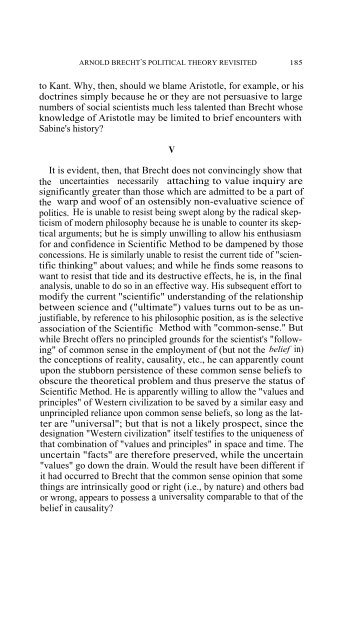ARNOLD BRECHT'S POLITICAL THEORY REVISITED Political ...
ARNOLD BRECHT'S POLITICAL THEORY REVISITED Political ...
ARNOLD BRECHT'S POLITICAL THEORY REVISITED Political ...
You also want an ePaper? Increase the reach of your titles
YUMPU automatically turns print PDFs into web optimized ePapers that Google loves.
<strong>ARNOLD</strong> BRECHT ' S <strong>POLITICAL</strong> <strong>THEORY</strong> <strong>REVISITED</strong> 185<br />
to Kant. Why, then, should we blame Aristotle, for example, or his<br />
doctrines simply because he or they are not persuasive to large<br />
numbers of social scientists much less talented than Brecht whose<br />
knowledge of Aristotle may be limited to brief encounters with<br />
Sabine's history?<br />
V<br />
It is evident, then, that Brecht does not convincingly show that<br />
the uncertainties necessarily attaching to value inquiry are<br />
significantly greater than those which are admitted to be a part of<br />
the warp and woof of an ostensibly non-evaluative science of<br />
politics. He is unable to resist being swept along by the radical skepticism<br />
of modern philosophy because he is unable to counter its skeptical<br />
arguments; but he is simply unwilling to allow his enthusiasm<br />
for and confidence in Scientific Method to be dampened by those<br />
concessions. He is similarly unable to resist the current tide of "scientific<br />
thinking" about values; and while he finds some reasons to<br />
want to resist that tide and its destructive effects, he is, in the final<br />
analysis, unable to do so in an effective way. His subsequent effort to<br />
modify the current "scientific" understanding of the relationship<br />
between science and ("ultimate") values turns out to be as unjustifiable,<br />
by reference to his philosophic position, as is the selective<br />
association of the Scientific Method with "common-sense." But<br />
while Brecht offers no principled grounds for the scientist's "following"<br />
of common sense in the employment of (but not the belief in)<br />
the conceptions of reality, causality, etc., he can apparently count<br />
upon the stubborn persistence of these common sense beliefs to<br />
obscure the theoretical problem and thus preserve the status of<br />
Scientific Method. He is apparently willing to allow the "values and<br />
principles" of Western civilization to be saved by a similar easy and<br />
unprincipled reliance upon common sense beliefs, so long as the latter<br />
are "universal"; but that is not a likely prospect, since the<br />
designation "Western civilization" itself testifies to the uniqueness of<br />
that combination of "values and principles" in space and time. The<br />
uncertain "facts" are therefore preserved, while the uncertain<br />
"values" go down the drain. Would the result have been different if<br />
it had occurred to Brecht that the common sense opinion that some<br />
things are intrinsically good or right (i.e., by nature) and others bad<br />
or wrong, appears to possess a universality comparable to that of the<br />
belief in causality?
















